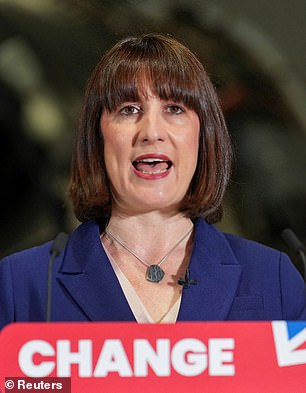Table of Contents
- Treasury officials have long had an aversion to pension tax breaks
- These benefit more those with higher incomes
- Eliminating them has an instinctive socialist appeal
Everything changes: Chancellor Rachel Reeves
Rachel Reeves is expected to present a report tomorrow on the catastrophic mess she would have us believe the Tories have made of the economy. This is, of course, a transparent fig leaf to hide her multi-billion pound tax raid plans.
There is widespread fear that this will include tax relief for pensions.
Labour has experience: Gordon Brown’s shameful attack on pension fund dividends was the death knell for private sector final salary schemes, once the envy of the world.
Reeves has ruled out increases in the so-called “big three” taxes – income tax, national insurance and VAT. His options for raising revenue are therefore limited and pensions look like an easy target.
Ask anyone in the pensions industry and they will tell you that Treasury officials have long rejected pension tax breaks that benefit top earners the most. Scrapping them has an instinctive socialist appeal.
Under the current system, people receive a tax break on contributions to their pension scheme at their highest marginal rate. For someone earning a six-figure salary and paying 45 per cent income tax, each £1 contribution to their pension scheme would cost just 55p. For someone on a lower income and paying basic rate tax, a £1 contribution would cost 80p.
At first glance it seems unfair.
But one suspects that those Treasury officials hate higher-rate pension relief for reasons of cost rather than equity. It may be an urban legend, but they are said to have put a plan to get rid of higher-rate pension relief on the table of every Chancellor of the Exchequer since George Osborne.
One option likely to be put to Reeves is a flat 30 percent relief rate for all sectors. She herself has advocated such an idea in the past. Before the election, she was reluctant to do so, but she has not ruled it out definitively. She should.
Not only would it be vindictive, damaging to some six million voters earning more than £50,000, but it would also be counterproductive.
The problems surrounding tax cuts are overshadowed by a much bigger pensions problem: the fact that almost four in ten of us are not saving anywhere near enough.
The erosion of tax incentives is likely to make matters worse.
This would be a particularly bad time to curb pension relief, as millions of people on moderate incomes are being pushed into higher tax brackets by a multi-year freeze on thresholds and allowances.
Attempts to restrict pension tax breaks for the wealthiest have perverse consequences.
We saw this with the lifetime cap on pension funds and a 55% super-tax on savings above the limit, which was abolished by Jeremy Hunt. Instead of generating huge amounts of tax revenue, it encouraged valuable employees, such as senior doctors and school governors, to retire.
Labour has, for now, backed off plans to reinstate it. Its attack on higher rates of tax relief could have a similar effect.
If less money goes into people’s pensions, Reeves’ mission to use the country’s retirement funds to invest in much-needed infrastructure will be hampered.
One irony is that the often-criticised complexity of pensions may frustrate any plans to abolish higher rate cuts.
And Labour would face a huge backlash if NHS staff and civil servants were faced with huge tax bills for their own contributions and those of their employers. Hopefully this will have a deterrent effect.
A pension pickpocket at number 11 is the last thing the country needs.
DIY INVESTMENT PLATFORMS

AJ Bell

AJ Bell
Easy investment and ready-to-use portfolios

Hargreaves Lansdown

Hargreaves Lansdown
Free investment ideas and fund trading

interactive investor

interactive investor
Flat rate investing from £4.99 per month

Saxo

Saxo
Get £200 back in trading commissions

Trade 212

Trade 212
Free treatment and no commissions per account
Affiliate links: If you purchase a product This is Money may earn a commission. These offers are chosen by our editorial team as we believe they are worth highlighting. This does not affect our editorial independence.

